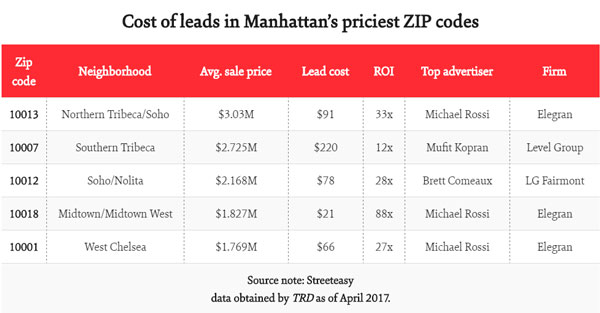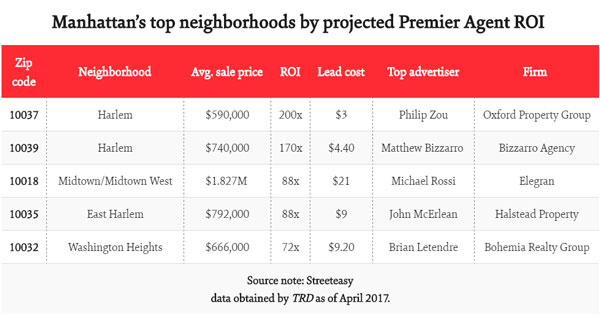In April, Mufit Kopran inked the biggest deal of his career when his client agreed to buy a $6.25 million condo in Tribeca.
The buyer, an international businessman, might ordinarily have chosen a more seasoned agent to represent him – Kopran, of the Level Group, has been in the business all of two years – but the two were connected through StreetEasy’s new Premier Agent program, which allows agents to advertise for leads next to other brokers’ listings in a particular ZIP code.
For Kopran, who’s got much of his business by buying leads from sites such as Zillow and Trulia, the polarizing new feature, which launched March 1, has been a boon. A few weeks in, his inbox was so flooded with prospective leads that he decided to focus on just a single Tribeca ZIP code: 10007. That put him in direct competition with one of the city’s biggest brokers, “Million Dollar Listing New York” star Ryan Serhant. The two are currently in a bidding war for top billing in the ZIP, with Kopran spending $5,300 a month to secure the lion’s share of incoming leads.
“I wanted to be No. 1 in Tribeca,” Kopran said. “Pretty much every day, I checked my position.”
Though the leads don’t always pan out, Kopran and others see Premier Agent as a great equalizer in the brokerage game.
“It doesn’t mean you’ll get lucky all the time, but you could,” he said.
In New York, the minnows have always found it tough to compete with the likes of Douglas Elliman, the Corcoran Group and their ilk, given the big players’ fat advertising budgets and death grip over sales exclusives. Compounding their misery is the city’s lack of a unified multiple listing service, which makes it hard for new names to break through. But just two months after Premier Agent launched, sources say it’s already shaking up the established order by giving no-name brokers direct access and leads to buyers that might otherwise flock to bigger firms. That is, if they’re willing to pay for it.
David vs. Goliath
Buyers connected with a broker through the program can’t differentiate between household-name brokers and newbie agents. Insiders said that’s likely to hurt firms that have assembled a stable of prominent talent.
The leaders of the biggest firms, such as Corcoran’s Pam Liebman and Brown Harris Stevens’ Hall Willkie, have spoken out against the program, which they say is “pay-to-play” and unethical. It renders expertise and reputation meaningless, they say, and also violates state advertising laws by allowing agents to put their name next to another agent’s listing. The Real Estate Board of New York, in a letter to the Department of State, said that the initiative created “a maelstrom of consumer confusion.”
It doesn’t mean you’ll get lucky all the time, but you could.
Here’s how it works: Buyers who click on a contact form that appears next to a specific listing are directed to “premier agents” who advertise through the platform in a particular ZIP code. (Buyers can now choose to switch to the listing broker.) StreetEasy has been tweaking the feature over the past month in response to criticism from listing agents and CEOs.
Some of the most active companies on Premier Agent are boutique agencies and tech-focused firms, such as LG Fairmont, Elegran Real Estate, TripleMint and Level Group, data obtained by The Real Deal show. Agents from those firms, who’ve largely been invisible at the top end of the market, are showing up at open houses in some of the city’s toniest neighborhoods with clients they connected with through the program, sources said. Many of those firms have been buying leads from national sites such as Trulia and Zillow for years, so they’ve already got systems in place to put the leads to use.
A top agent told TRD she’d never heard of LG Fairmont until receiving multiple showing requests from the company’s brokers over the past few weeks.
“It’s put the smaller firms on the playing field,” said Andrew Heiberger, CEO of Town Residential, who opposed the feature when it first launched but said some of his agents have been getting business from it.
“It’s not an equalizer, but it’s a door opener,” he said. “We can take a position as a company but at the end of the day, our agents are independent contractors and they’re free to advertise where they want to.”
“Agents are seeing this as an opportunity,” said StreetEasy general manager Susan Daimler, who has maintained throughout the drama that Premier Agent is designed to give buyers more choice.
Brokers from Corcoran have also been using the feature, despite Liebman’s letter to her agents that the firm would not provide a budget for it.
“Agents who are willing to invest in their business are exploring this opportunity,” Liebman told TRD. “While listing brokers are upset about the fact that people are generating leads from their properties, the fact is that this is a program that exists. Some people like it enough to continuously use it and others are curious and aggressive enough to give it a try.”

Early adopters
Some of the bigger names active on Premier Agent, the data seen by TRD show, are Douglas Elliman’s Ariel Cohen, who has been advertising on his home turf of the Financial District; Andrew Azoulay, who’s targeting Tribeca; and Tom Postilio and Mickey Conlon, who’re focusing on West Chelsea. Elliman’s Daniela Kunen Team, as well as Eugene Litvak and Karen DeMeco of Compass and Karen Stone of Town, have been jockeying for position on the Upper East Side. However, some of those more seasoned agents said while they’ve seen their volume of leads go up, they’re not necessarily high-quality leads.
It’s not an equalizer, but it’s a door opener.
And then there’s Ryan Serhant. The Nest Seekers International broker made a theatrical protest against the initiative in March, when he posted videos showing how his listings were being linked to agents with zero experience in the building. At the time, he called Premier Agent “shocking” and “illegal.” Now, however, he’s an active user.
“I thought when I did that video that New York brokers and New York brokerages were going to fight back,” Serhant said. “The exact opposite happened. A week later, every other agent was buying into the Premier Agent system.”
Serhant said he had several conversations with StreetEasy, and was pleased to see that it tweaked the contact form so that buyers can now contact listing agents directly if they wish.
“I’m not going to be the guy who, in 1994, said the Internet wasn’t going to affect the real estate business,” he said. “If real estate brokers in the city are going to opt into the Premier Agent system, then I mean, it is a moral imperative of mine to also give buyers the opportunity to work with myself and my team, who I feel are much more capable brokers than anyone else.”
For now, he said he’s “testing the waters,” but intends to use the program “as heavily as I possibly can.”
As more brokers decide to give the initiative a shot, competition for pole position in popular ZIP codes is heating up. And, as a consequence, the auction-based pricing for Premier Agent is getting more expensive. The program is the biggest source of revenue for StreetEasy’s parent firm, Zillow Group, where it’s been a feature for a number of years and brought in more than $600 million in 2016.
On StreetEasy’s back end, brokers can view a real-time leaderboard showing their position, which is based on how much they spend. The higher their position, the more leads they receive.
Mdrn. Residential’s Kobi Lahav — a Premier Agent in the Flatiron district — said he re-upped his budget after dropping from the No. 1 to No. 8 position overnight. “You’re losing potential revenue and potential deals if you’re not joining,” he said.
The price is right
As of late April, the most expensive ZIP code in the city was 10013, an area spanning Northern Tribeca, where the average home value, according to StreetEasy, is just over $3 million. Michael Rossi, CEO of Elegran, topped the leaderboard for that ZIP code, where the average cost of a lead in the neighborhood was $91 as of late March. For that price, he could expect an average return of 33 times his investment, according to the platform. In 10007, which covers Southern Tribeca north and west of City Hall, Kopran topped the leaderboard. In Southern Tribeca, leads were priced at $220 each in late April, with a projected return of 12x — the lowest in Manhattan, according to StreetEasy. (Battery Park City, where leads cost $68, also had ROI of 12x.)

The top ZIP code, based on projected ROI, was 10037 in Harlem, where leads cost just $3 but brokers could expect to see 200 times return on the capital they plowed in, according to StreetEasy.
Philip Lang, co-founder and COO of TripleMint, said participating in the program had been a “no-brainer” for his firm, since it had already been betting heavily on online lead generation.
“The signs point to this being very successful for us,” Lang said. For Premier Agent to really work well, however, Lang believes firms as a whole must get behind it, rather than a few lone wolves.
“There is a science to making this work properly,” he said. “If you don’t have a system to track it, it’s impossible to figure out if there’s a return on it. You can’t just dip your toe in, you have to go all the way to do a proper test.”
Several firms said they’ve already seen their leads double since they began investing in Premier Agent, though what that’ll mean for their profits is still unclear.
“You can get early indications pretty quickly in terms of the quality of leads, but it will take three to six months to determine if those people actually close and to see the ROI,” Lang said.
It is a moral imperative of mine to also give buyers the opportunity to work with myself and my team, who I feel are much more capable brokers than anyone else.
Sarah Saltzberg, co-founder of Bohemia Realty, said that while some Premier Agent leads are “legit, serious clients,” others needed to be more seriously vetted. “It’s a bit of a mixed bag,” she conceded. “I think that agents will do it for as long as they see a return and it makes sense for them.”
In some ways, investing in leads can be seen as an alternative to investing in new brokers, sources said. In other words, some firms are betting they do more business by feeding Premier Agent leads to their existing agents rather than paying top dollar in commissions and incentives in order to attract new talent.
Still, as the feature gains popularly, its effectiveness will take a hit, Heiberger said. “It doesn’t take long for word to spread that something is working,” he said, “so that means it will get diluted at some point.”
